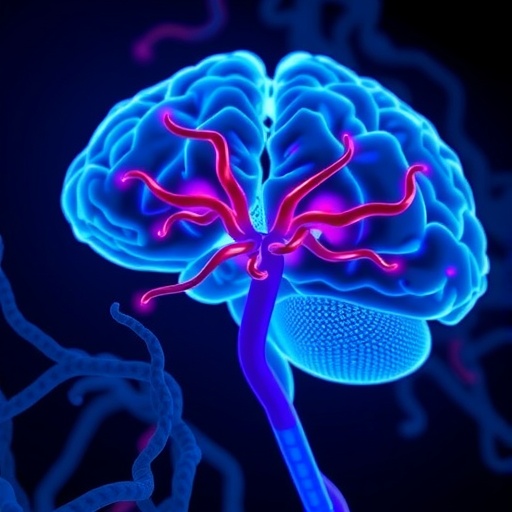In a groundbreaking advancement that bridges two of the most pervasive neurological conditions afflicting the aging population, researchers have unveiled compelling genetic evidence establishing a causal link between Alzheimer’s disease (AD) and cerebral small vessel disease (CSVD). This revelation, emerging from a sophisticated Mendelian randomization study, not only illuminates intricate pathophysiological interconnections but also opens promising avenues for targeted therapeutic interventions. The study, spearheaded by Liu, Chen, and Chen and published in Translational Psychiatry in 2025, represents a paradigm shift in our understanding of neurodegenerative and vascular contributions to cognitive decline.
Alzheimer’s disease has long been recognized as the most prevalent cause of dementia worldwide, characterized primarily by amyloid-beta plaque deposition and neurofibrillary tangles composed of hyperphosphorylated tau protein. However, the multifactorial nature of AD, especially the vascular components that exacerbate neurodegeneration, remained inadequately dissected. Meanwhile, cerebral small vessel disease – a heterogeneous group of pathological processes affecting the brain’s microvasculature – has been increasingly implicated as a major contributor to cognitive impairment and stroke. The novel study leverages genetic analytic tools to untangle the causality enmeshed within these two overlapping disorders.
Mendelian randomization (MR) is a cutting-edge epidemiological approach that exploits naturally occurring genetic variations as instrumental variables to infer causal relationships between risk factors and diseases. By using genetic variants robustly associated with Alzheimer’s disease and cerebral small vessel disease, the researchers could assess the directional influence from one pathology to the other while minimizing confounding effects endemic to traditional observational studies. This method overcomes the typical limitations of reverse causation and unmeasured confounders, providing a powerful framework for establishing causal inference from genetic data.
The research team integrated comprehensive genome-wide association study (GWAS) datasets encompassing thousands of individuals of diverse ancestries. These datasets supplied the necessary genetic variants linked to clinical and subclinical phenotypes of AD and CSVD. Through advanced statistical modeling and sensitivity analyses, the study dissected whether genetic liability to Alzheimer’s disease increases the risk of cerebral small vessel disease or vice versa, thereby clarifying the temporal and causal directionality.
Findings from the study decisively demonstrate that genetic predisposition to Alzheimer’s disease exerts a significant causal effect on the risk of developing cerebral small vessel disease. This discovery substantiates prior clinical observations that cerebrovascular pathology frequently coexists with Alzheimer’s neuropathology but firmly establishes that Alzheimer’s disease progression may actively promote microvascular damage rather than the vascular pathology simply being a parallel or independent process. Conversely, the data did not support a reciprocal causal influence of CSVD genetic risk on Alzheimer’s disease susceptibility, highlighting the primacy of neurodegenerative pathology as a driver in this interaction.
This causality insight carries profound implications for interpreting mixed dementia presentations, wherein patients exhibit overlapping neurodegenerative and vascular brain injuries. It lends credence to the hypothesis that AD-related molecular alterations, including amyloid accumulation and tau pathology, may initiate or exacerbate microvascular dysfunction and blood-brain barrier impairment, which are hallmarks of cerebral small vessel disease. Understanding this pathological cascade is pivotal for refining diagnostic criteria and stratifying patients for clinical trials.
Mechanistically, the study’s results align with experimental data suggesting that amyloid-beta peptides possess vasoactive properties that can induce endothelial dysfunction, promote microvascular rarefaction, and provoke neuroinflammation. Moreover, tau pathology might contribute to vascular instability through interactions with cellular cytoskeletal components in vascular smooth muscle cells. These effects collectively compromise cerebral microcirculation, exacerbating ischemia and neuronal injury, thereby accelerating the decline in cognitive function.
Therapeutically, recognizing Alzheimer’s disease as an upstream factor in CSVD pathogenesis challenges current treatment paradigms that compartmentalize neurodegeneration and vascular pathology. This integrated perspective advocates for early interventions targeting amyloid and tau pathology with the goal of preventing downstream microvascular damage. Additionally, it underscores the value of developing neurovascular protective agents that can safeguard cerebral microvessels against AD-driven insults, potentially halting or slowing disease progression.
The study also emphasizes the utility of genetic data in unraveling complex disease networks, advocating for expanded multi-omic approaches that couple genomic information with transcriptomic, proteomic, and imaging biomarkers. Such integrative analyses could further elucidate the molecular underpinnings linking AD and CSVD, as well as identify novel targets for disease-modifying therapies. Early detection strategies informed by genetic risk profiling may facilitate personalized medicine approaches tailored to individual patient vulnerabilities.
Importantly, this Mendelian randomization inquiry has set a precedent for future research exploring causal relationships across other intersecting neurological disorders. As the global population ages, the burden of dementias and cerebrovascular diseases is expected to rise exponentially. Comprehensive understanding of causal pathways will be paramount for developing effective prevention and management strategies that can mitigate disability and improve quality of life.
In conclusion, Liu and colleagues’ pivotal study offers a decisive step forward in decoding the enigmatic relationship between Alzheimer’s disease and cerebral small vessel disease. Through rigorous genetic analyses, it establishes Alzheimer’s disease as a causal contributor to the development of microvascular pathology, reshaping conceptual frameworks and clinical approaches toward these intertwined disorders. This insight fuels optimism for innovations in diagnosis, therapeutics, and ultimately, the amelioration of cognitive decline affecting millions worldwide.
Subject of Research: Genetic causal relationship between Alzheimer’s disease and cerebral small vessel disease evaluated via Mendelian randomization.
Article Title: Causal relationship between Alzheimer’s disease and cerebral small vessel disease: a Mendelian randomization study.
Article References:
Liu, R., Chen, L. & Chen, X. Causal relationship between Alzheimer’s disease and cerebral small vessel disease: a Mendelian randomization study. Transl Psychiatry 15, 317 (2025). https://doi.org/10.1038/s41398-025-03560-8
Image Credits: AI Generated




